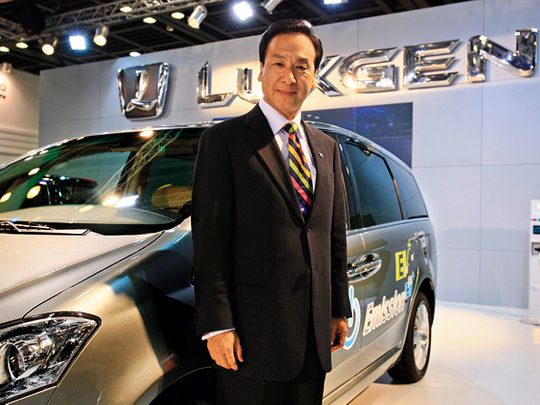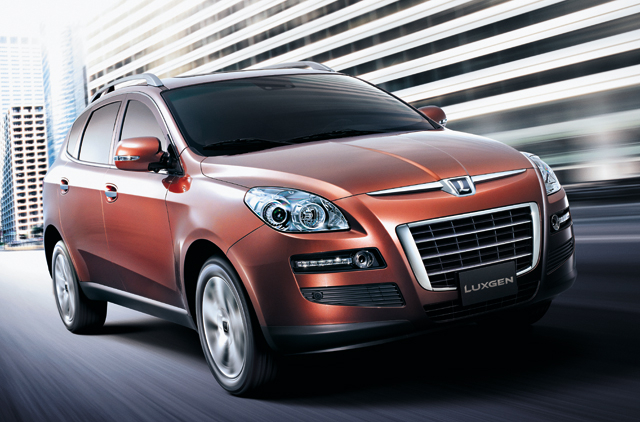
The small boy jumps up and down excitedly. "Look!" he shouts. "It looks so big, and so cool… just like our Grandis!"
His parents and siblings follow him to the Luxgen stall (which was at the Dubai International Motor Show last month) to check out what has caught his fancy. The boy was pointing to an MPV (multi-purpose vehicle, or in lay terms a van). The boy was not alone. A small crowd has gathered, gaping at and admiring the automobile.
Agreed, it was not the kind of buzz that was palpable around the supercars at the show, but the MPV, standing amidst the glamorous Aston Martins and Ferraris, was without doubt creating a stir among motorheads maybe not with its looks, but certainly with the technology driving it.
Welcome to Taiwan's newest and only indigenously manufactured car - the Luxgen.
"It was launched just three months ago in Taiwan," says K. C. Hu, CEO, Luxgen Motors. "The response has been extremely good."
The reason Hu is happy with the response is because the MPV segment is not very big in Taiwan. Despite stiff competition, the Luxgen MPV has done well. "We have sold almost 2,400 within three months. I would say we are very successful," exclaims Hu.
No mean feat considering Taiwan's domestic automobile market came down to about 220,000 units in 2008. "We knew we had to create our own brand to get out of merely using imported vehicles and technology," says Hu. "But yes, Luxgen is targeting not only Taiwan but the whole world - starting with, of course, the Middle East."
Taiwan, and perhaps even the world, is ready for a new hi-tech car, but is that an MPV? Hu is ready with an answer to this: "When the market is already saturated, the only way a new company can make an impact is with a different or innovative product. This is especially important during these times. We realised that, and it was the starting point for devising our product range."
Luxgen was also aware that any product differentiation or innovation made by them, a relatively small company, could be matched by the established car manufacturers within a short period, says Hu. So, the fledgling company decided to concentrate on technology.
"We decided to integrate Taiwan's very successful IT infrastructure into our vehicles," he reveals. "There are so many world-class IT players in Taiwan, such as HTC and Acer. The thinking was if their IT-related technological strength, as well as their know-how and expertise in related fields, were used in our vehicles we could rival the technology offered by even the world's largest automakers like GM and Toyota. This would give us an edge of two, even three years."
While the world has still not accepted the ‘Made in China' label as far as automobiles are concerned, Hu is very confident of the competitiveness of Luxgen products. "The ‘Made-in-Taiwan' label has come to denote high quality, high-level products, and medium-to-high prices/features in recent years," he notes. "We are certainly not looking at selling our cars cheaper to grab market share. That's also the reason we are not afraid of entering the Chinese market. Our market position will be quality and technology at a reasonable price."
The IT-related features that are available in Luxgen cars make them "smart; they can think," explains Hu.
HTC has built a full-on car computer called Think+ for Luxgen. The system has embedded GPS navigation, 3.5G communications, and an integrated 10.2-inch display. Hu proudly showed off the system available in the Luxgen 7 MPV.
The range of functions includes voice-activated calling, SMS read-back, media playback from USB devices, media entertainment, car diagnostics and road safety, night vision, parking assist, and enough cameras to give a 360-degree and top-down view.
The Eagle View+ 360-degree parking assist programme, which uses four video cameras to provide a real-time visual display when parking is certainly revolutionary. The Night Vision+ high sensitivity night vision camera system and the LDWS+ system, which scans the road for lane markers and dividers and gives warnings if the car veers too close to the other lanes are the kind of features one would expect in a high-end car - in the future.
Luxury is apparent in the wood and leather-washed interiors. The seats have massage functions and other knickknacks that you normally see only in high-end cars.
With these kind of features it should naturally be more costly than its rivals. But surprisingly the Luxgen's starting price is estimated to be around Dh90,000 according to Hu. "It is affordable luxury," he points out.
Hu has done his homework well. He's been vice-president of Ford's marketing and sales in Taiwan, CEO of Mazda Taiwan, and ended up pushing Ford vehicles in China before he joined the Yulong Group which owns Luxgen.
"We wanted to learn from the mistakes Chinese automakers made," he says. "We will price our vehicles competitively, this may be equal to other brands, or a little more depending on the case. But certainly we will offer value for money."
The other area that Luxgen boasts a first in is the electric version of the MPV. The Luxgen EV+ is the "world's first electric seven-passenger MPV", claims Hu proudly.
While other brands may have electric vehicles which seat a maximum of five, Luxgen puts its seven passengers into minivan-sized comfort.
"The battery in the Luxgen EV+ is from AC Propulsion, pioneers in the field," informs Hu.
The 2.2-litre engine, which is powered by lithium ion cells, puts out 265 Nm of torque and does the 0-100km dash in 8.6 seconds, he claims. Top speed is said to be around 145kmph.
But Luxgen is not going to flog the EV version here for obvious reasons. "The EV can be driven on the roads but cannot be registered, even in Taiwan," says Hu.
Until the government is willing to set up the infrastructure required to put electric vehicles on the roads, the EV will not take off. That's the reason why the cost of the vehicle is so high." It is estimated to cost thrice that of the regular MPV.
Luxgen and Hu have their feet firmly on the ground.
The electric vehicle is obviously there to convince sceptics that Taiwan's fledgling carmaker can match anything the established automakers can throw at them. And then some.
But Hu is not keen on taking the fight into the enemies' homes right now. "We are looking at the GCC, Central America and Russia," he says.
"We may even consider setting up CKD (completely knocked down) units in these places. But we expect to advance the most in the Middle East.
We have 10 potential partners interested in becoming our dealers. They have been to our plant in Taiwan, they like our vehicles and are convinced of our capability."
But it should be towards the end of the year before you see a Luxgen on the UAE roads.
"The reason is we haven't launched our SUV in Taiwan yet," explains Hu. "We plan to do that in the second quarter. We've been told that the SUV would be a more appropriate vehicle to launch first in this market. So, we're waiting for that."
The tiger bides its time.



